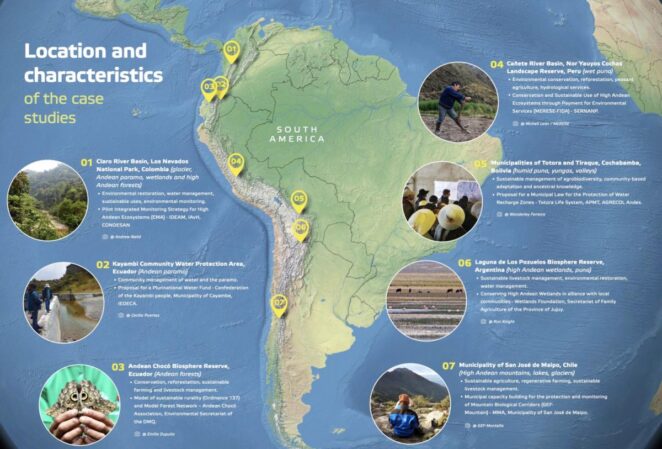Current state of climate change policies and adaptation strategies in the Andes: A multi-sectoral view from the mountains

The text below provides a summary of the policy brief Climate change policies in the Andes: Dialogue between scales and perspectives for adaptation, by Emilie Dupuits, published in Propuestas Andinas No 18. Quito: Adaptation at Altitude, Andean Forests Programme, CONDESAN. The policy brief is based on the study Current state of climate change policies and adaptation strategies in the Andes: A multi-sectoral view from the mountains, by Emilie Dupuits, 2021,Quito: CONDESAN-SDC. You can also read the proceedings of the webinar presenting the findings. For much more detail, you can download the policy brief in the right hand column. Spanish versions of the featured documents can be found on CONDESAN webpage.
Read this article in Spanish here.
Introduction
The Andean region presents fundamental challenges due to the increasing pressure on landscapes and ecosystems, which affect its globally important natural heritage and its diverse social systems, accentuated by the effects of climate change (CC). In the last decade, States in the region have been consolidating their climate policies at the (sub)national level, including Nationally Determined Contributions (NDCs), CC adaptation plans, strategies, laws, and sectoral regulations on the subject.
At the regional level, the Andean Mountain Initiative (IAM) has been consolidating as a key space for the discussion and coordination of adaptation policies focused on mountain socioecosystems. In this context, the Andean Forests Programme and the Adaptation at Altitude Programme have promoted a process of knowledge synthesis at the regional level to update the current situation of the regulatory framework and climate policies in the Andean countries, from a multi-sectoral viewpoint and from the mountain socioecosystems perspective, with an emphasis on plans and strategies for adaptation to CC.
The present publication is part of this knowledge synthesis effort. One of the main objectives of the present publication was to identify gaps, opportunities and priorities to guide the work of decision-makers and the political advocacy of those implementing projects and strategies to promote sustainability and adaptation to CC in mountain areas in the coming years. The central question is to understand the institutional challenges and local perceptions regarding the implementation of CC adaptation policies in the Andean countries.
*Download the full publication from the right-hand column. A summary of the key findings is provided below. See the full report for more details
Methods and Tools
The present research is based on two key concepts: multi-scale governance and knowledge co-production. A series of indicators associated with these concepts made it possible to analyze the situation in the countries of the Andean region. A multi-scale governance and institutional gap analysis approach was adopted to synthesise and compare policies, strategies, plans and programmes relevant to climate change adaptation as a cross-cutting issue.
The study also includes advances in monitoring and evaluation of adaptation, and takes into account policies and programmes in different sectors (environment, risk management, water, agriculture, forestry and other land uses, energy and health, among others). Synergies and opportunities were also analysed, as well as possible tensions and resistance that may be generated by the implementation of climate change adaptation policies in the territories. For this purpose, the approach of co-production of knowledge and policies between public authorities at different levels, civil society organisations, international cooperation, academia and the private sector was applied. The dynamics of the dialogue between scales and knowledge for adaptation is shown schematically below.

Seven case studies at the provincial / local level that represent the diversity of socio-environmental, ecosystem and institutional contexts throughout the Andes were selected for research, as shown in the map below. The cases reflect both the progress and challenges of the implementation of climate change adaptation policies in the territories.

Lessons Learnt
The study revealed that, in some cases, there is a disconnection between the instruments and spaces designed in national policies and their concrete implementation or use at the local level by municipalities and civil society organisations. There tends to be an excessive creation of instruments or spaces related to CC governance, described as a “climatisation” process, which tends to obscure the tools and spaces that are already being used locally.
On the other hand, a series of important initiatives in the countries of the Andean region have been identified in the study. For example, in terms of inter-institutional articulation, a series of more effective tools have been created, with the capacity to adapt to variation in local contexts (among which we can mention: Law of Remuneration Mechanisms for Ecosystem Services, Peru; Law 1930 for the Comprehensive Management of the Páramos, Colombia; Proposal of the Law of Wetlands, Argentina). Policy instruments have appeared at the subnational level or through pilot programs (for example, District of Soil, Water and Forest Conservation, Ministry of Agriculture, Chile; Strategy for the Integrated Monitoring of High Mountain Ecosystems in Colombia ( EMA), Colombia; Pilot Intervention Plan of EMAPA, Cañete, Peru) that have the potential to improve inter-sectoral articulation on CC.It remains a challenge in this regard to explicitly link these initiatives to CC strategies or policies at the national level
One of the critical points identified throughout the study is the need to generate effective mechanisms for social participation, institutionalisation of relevant local knowledge and co-production with techno-scientific knowledge. The study revealed the barriers that community-based organisations often face when it comes to expanding their local and historical knowledge, in terms of legitimacy, conflicting visions of territory and natural resources, and articulation with technical-scientific knowledge. While there have been initiatives from academia to promote ancestral knowledge related to climate measurement or watershed conservation, effective dialogue between diverse knowledge has not yet been consolidated to legitimise the scientific validity of relevant local knowledge and, in turn, promote the effective use of available technical-scientific tools by local actors.
However, advances have also been made in this regard, particularly the strengthening of participation mechanisms at the territorial level (e.g., water summits, management plans, mancomunidades, municipal ordinances). The key role of municipalities is highlighted in alliance with local communities for the implementation of productive and adaptive alternatives to CC (eg Sustainable management plan for cattle grazing, Laguna de los Pozuelos, Argentina; Livestock pilot plan with the community of Las Tórtolas, Municipality of San José de Maipo, Chile; Special Plan for Land Use and Occupation of the Mancomunidad del Chocó Andino, Ecuador; Pilot Plan of Interventions in the Peasant Community of Miraflores, Peru). The challenge remains to guarantee sustainability by consolidating local governance spaces from the state.
Suggested citations
Policy Brief: “Climate change policies in the Andes: Dialogue between scales and perspectives for adaptation”, by Emilie Dupuits, Propuestas Andinas No 18. Quito: Adaptation at Altitude, Andean Forests Programme, CONDESAN
Study: Dupuits É. 2021. Current state of climate change policies and adaptation strategies in the Andes: A multi-sectoral view from the mountains.Quito: CONDESAN-SDC.
- Adaptation to Climate Change in the Andes: gaps in understanding and opportunities for knowledge management
- Protocolo para el monitoreo de fenología y polinización en cumbres de la red GLORIA-Andes Venezuela
- Contribución al Conocimiento de la Vegetación Altoandina: riqueza florística y clave para la identificación de plantas ...
- Flora altoandina de Huaca Huasi. Guía visual
- Los Andes Después del Hielo: El Último Glaciar de Venezuela
- Memoria del Conversatorio Políticas de Cambio Climático y las Estrategias de Adaptación de los Andes: una mirada multisectorial
- Hacia una agenda de investigación para el monitoreo integrado de ecosistemas andinos: aportes para la sostenibilidad ...
- MOUNTAIN-EVO: Adaptive governance of mountain ecosystem services for poverty alleviation enabled by environmental virtual ...

Comments
There is no content